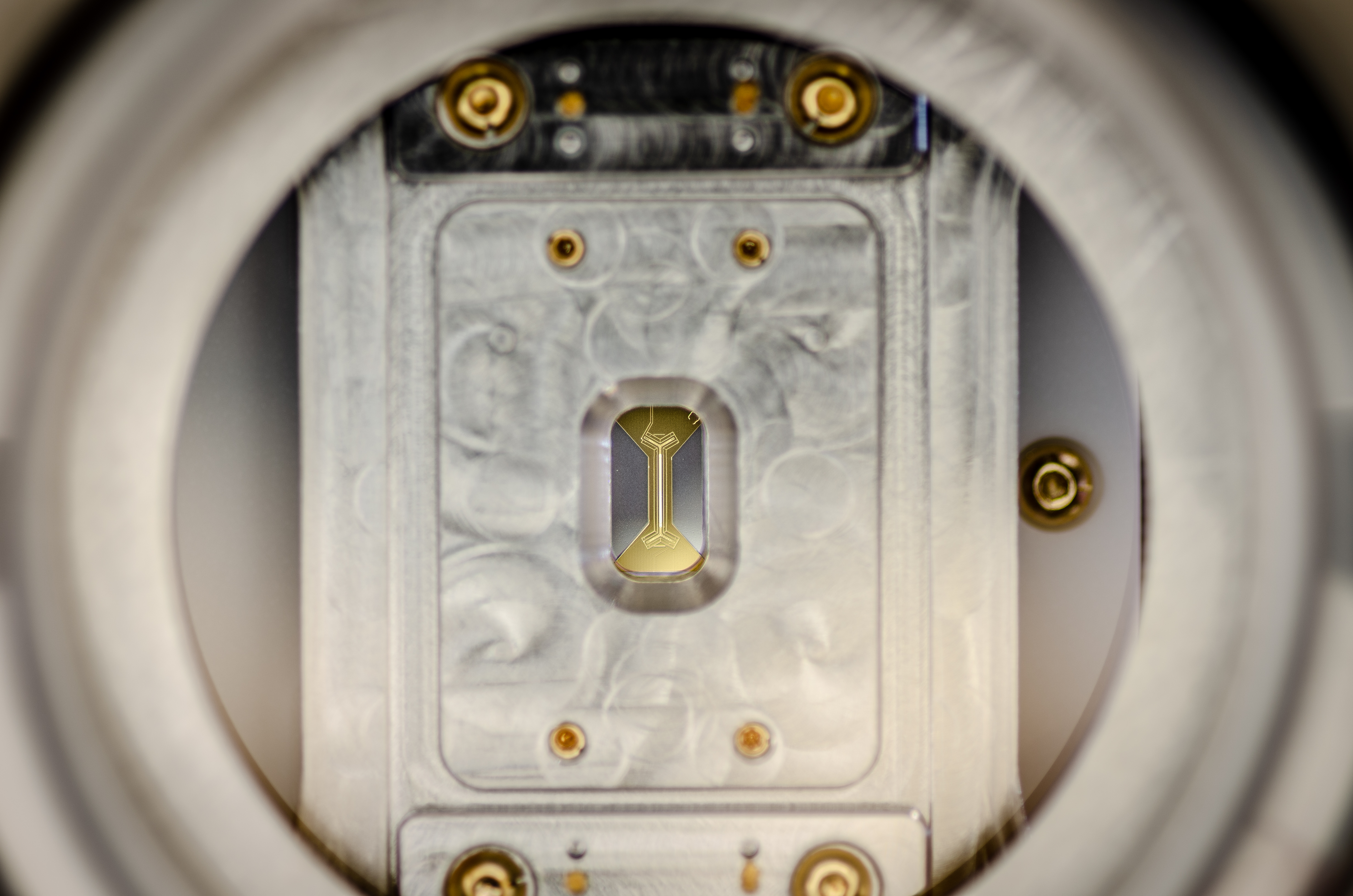Image may be NSFW.
Clik here to view.
A view of the mounted ion trap that forms the core of a small quantum computer. Photo courtesy IonQ.
Jane Halpern | Department of Electrical Engineering and Computer Science
The members of iQuISE, MIT’s student-led organization focusing on quantum information science and computing, want to invite you to a hackathon. But not just any hackathon. MIT’s second annual Interdisciplinary Quantum Hackathon, to be held virtually from Friday, January 29th through Sunday, January 31st, will give interested participants from any background access to some of the most cutting-edge computing technology on the planet.
“Our goal is to provide a platform for students to learn about quantum computing and hardware while interfacing with some really cool technology,” said Maddie Sutula, who organized the event alongside fellow students Eric Bersin, Carlos Errando-Herranz, Amir Karamlou, Yuan Lee, Ben Lienhard, Luke Qi, and Michael Walsh. “We are hoping to reach a broad range of students, including those with software experience who haven’t worked much with quantum hardware and those who develop quantum hardware but may not have had an opportunity to run quantum codes.”
As this article from the MIT Technology Review explains, quantum computers differ from the “classical computer” on which you’re reading this story in several key ways: instead of using a string of digital 0s and 1s to encode and manipulate information, quantum computers use subatomic particles as qubits to create rich matrices of information. The increased computing capacity of quantum computers is rooted in the brain-bending ability of single subatomic particles to exist simultaneously in multiple states at once (superposition), and for paired subatomic particles to exist in a single, linked quantum state even across vast distances (entanglement).
Those quantum quirks enable a group of connected qubits to process much more data than the same number of binary bits, and give quantum computing an aura of unlimited possibility. “It turns out that if you can build a quantum computer big enough and with low enough error, you can solve problems that are currently totally unsolvable with classical computing in chemistry, drug development, medicine, codebreaking, etc,” says Jeremy Sage, Senior Physicist at IonQ. “Then there are other problems that we have an intuition quantum computing might help, such as optimization problems in finance. We’re still researching how well problems like these can be solved on a quantum computer.”
The participants in January’s hackathon will have access to an 11-qubit computer provided by platform sponsor IonQ. The 11-qubit computer is “a small quantum computer,” Sage explains, one which would not outperform the world’s most powerful traditional or “classical” computers, but which exceeds the processing power of most of the computers which still use ones and zeros. “By engaging with a large community of people, we hope that they’ll write algorithms that work well on these slightly smaller, noisier quantum computers.”
Image may be NSFW.
Clik here to view.
A view inside the IonQ 11-quibit computer. Photo courtesy IonQ.
Additionally, participants will have access to the Advantage™ quantum system, a quantum computer designed by platform sponsor DWave which uses a quantum annealing approach, in which qubits are harnessed to find the lowest-energy state of a problem, a process applicable to many complex optimization challenges, such as those found in shipping logistics.
Image may be NSFW.
Clik here to view.
The DWave quantum computer can run problems with up to 1,000,000 variables on general problems, and up to 20,000 variables on dense problems. Image courtesy DWave.
Event organizer Sutula expects that the algorithms produced during the hackathon will display the range and creativity of the participants. “In last year’s hackathon, we left it really open-ended what our participants could create. We offered examples of everything from algorithms that had recently been published in the literature to games that relied on the probabilistic nature of quantum gates, and so we saw a range of approaches from fun to academic. This year, we’re hoping to provide a little more structure, and will be asking the sponsors to provide some challenges.”
Those backers include platform sponsors IonQ and DWave, along with additional sponsors CQE, IBM Q, HRL Laboratories, Zapata Computing, Google-AI, and the MIT-IBM Watson AI Lab. “There are two main components we’ll provide,” said Matthew Keesan, Vice President of Development at IonQ. “First, there’s system time, which we’ll provide access to the computers and simulators at no charge along with some introductory training materials. But secondly, during the hackathon we’ll have folks available to mentor teams and offer feedback.”
The teams from IonQ and DWave will be joined by other sponsor representatives, quantum experts working in the computer industry, and MIT professors to help judge the contestants’ offerings on the final day of the event. Beyond the response to individual challenges, those judges will be looking for novelty, high-quality code, and strong written and verbal presentation skills from the contestants, who will connect with their chosen team members through Slack and Zoom throughout the three-day event. “It won’t be quite the same as the in-person event,” says Sutula, “but we’re hoping to generate a sense of community where people can go into breakout rooms and keep in touch with their teammates and other participants and the sponsors throughout the event.” Those participants will join the event from many different countries and educational backgrounds—the hackathon is open to everyone with an interest in quantum computing who meets some basic criteria explained in the hackathon’s FAQ.
To learn more about the quantum hackathon and to register as a team or individual participant, visit the event’s site here.
MIT’s Interdisciplinary Quantum Information Science and Engineering (iQuISE) program, a student-led organization of graduate students and post-docs with research interests in quantum information science, computation, and communication, is primarily sponsored by the MIT Center for Quantum Engineering.
Research Themes:
News Image:
Clik here to view.
